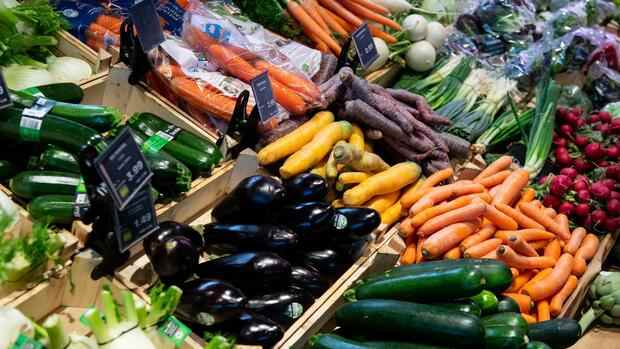Sales of groceries in May fell by 7.7 percent in real terms compared to the previous month.
(Photo: dpa)
Berlin Because of high inflation, German consumers are leaving significantly less money in the tills of retailers. Despite the easing of corona, their sales in April were 4.7 percent lower than in the previous month, as the Federal Statistical Office announced on Wednesday.
In real terms – i.e. price-adjusted – the minus was even 5.4 percent. Economists surveyed by Reuters had only expected a decline of 0.2 percent. “Real sales thus reached their lowest level since February 2021,” the statisticians summarized the result.
Business with food was particularly bad: Here there was a real minus of 7.7 percent. “This was the biggest month-on-month drop in sales since the time series began in 1994,” the statisticians explained. “This development is probably due to the significant rise in food prices.” In April, these were 8.6 percent more than a year earlier.
“This is probably just the beginning of a continuing consumer mess,” said the chief economist at Hauck Aufhäuser Lampe Privatbank AG, Alexander Krüger. The sharp rise in inflation is making it difficult for many private households to make a living.
Top jobs of the day
Find the best jobs now and
be notified by email.
“Consumers are already on strike when buying groceries,” said Krüger. This indicates that private consumption in the current spring quarter is likely to fail as an economic driver.
“Consumption mood is scary”
The war in the Ukraine and high inflation pushed consumer sentiment down to a record low in May, as the Nuremberg-based GfK market researchers found out in their surveys. “Despite Corona savings, the consumer mood is creepy,” said Krüger.
The inflation rate climbed to 7.9 percent in May because energy and food in particular cost significantly more as a result of the Russian war against Ukraine. The last time the values were similarly high was in the winter of 1973/1974, when mineral oil prices also rose sharply as a result of the first oil crisis.
The closure of large ports in China as a result of corona outbreaks is also exacerbating retail supply problems. 80.1 percent of retailers complained in May that they could not deliver all the goods ordered, as the Ifo Institute announced in its company survey. In April it was only 67.1 percent, at the previous high last December 81.6 percent.
“Many goods are not on the shelf, but in the container in a port in China,” said the head of the Ifo surveys, Klaus Wohlrabe. Two-thirds of retailers said the situation in China had exacerbated existing delivery problems
More: Study: Food prices are likely to rise by more than 10 percent in 2022
